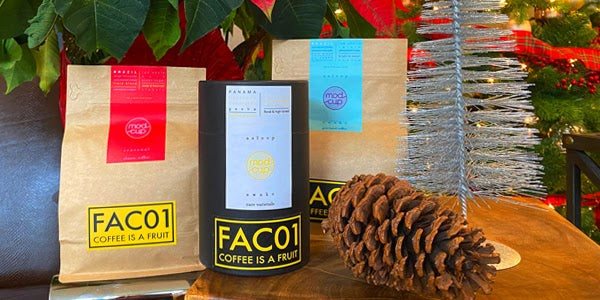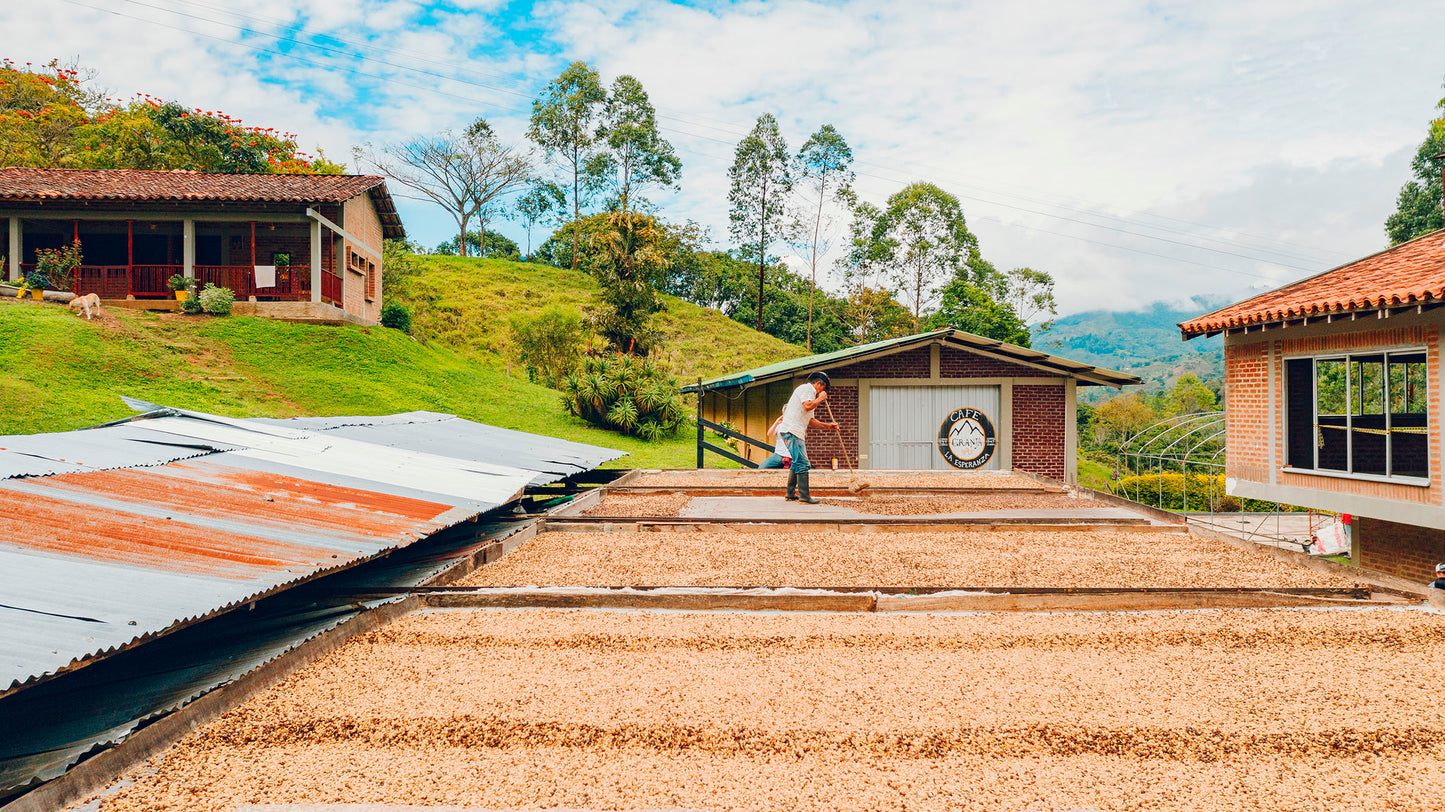
Modcup December Subscription Box
Modcup offers a monthly subscription service to cater for all tastes and all coffee drinkers; from the self-confessed coffee geeks, to burgeoning cuppers, and carafe-chuggers of the world, from single origin offerings from world class farms and estates to traditional Italian and American Diner style roasts - all can unite with a tailored monthly subscription coffee box that should hold all over with enough coffee for a month.
With the modcup monthly subscription, you’ll have exclusive early access to new coffees that find their way to the roastery, giving you the chance to experience the world through coffee. By the time you read this, your order should be en route if not in your hands already. Be ready to enjoy exciting seasonal coffees that haven’t even reached our brick-and-mortar retail shelves, an exclusive perk to being a modcup monthly subscriber.
Going with the idea that Economy Box subscribers choose which kilogram of blended coffee they want as a daily driver for the month, December’s box offers the chance to choose between two different single-origin coffees from our seasonal selection. Subscribers will have the option to choose either the washed Mexico Chiapas Mayan Harvest field blend or the new experimentally processed Brazilian natural in this season only.
Rosalba Cifuentes Tovia, founder of Mayan Harvest, founded her company in an effort to improve harvesting and processing of their products to better compete in the specialty coffee global market. Rosalba travelled to the states and discovered that Mexican coffees weren’t as prevalent in specialty coffee shops and set out to change that. This washed coffee is no slouch, exceeding in balancing sweet, tangerine notes with rich milk chocolate and citrus blossom. None of these flavors are dominant, and each compliments the other harmoniously. The cyclical evolution when tasting is as much a joy to experience now than it was the first time we tried it, so no wonder it has found its way into our incredibly fudgy-sweet cold brew blends.
We’ve spoken again and again about how modern specialty Brazilian coffees often lean into experimental processing methods to capture the inherently fruity flavors within, and our natural offerings in this season are no exception. This extended fermentation coffee from the Campos Altos growing region of Brazil is the result of the Carvalho family’s goal to continue the legacy of hard work started by the late Heron Reger Sr., but with modern approaches to production and sustainability. We are huge fans of both the Carvalho family’s stance on sustainability and innovative processing strategies to stay in competition on a global scale. We’re even bigger fans of the natural Brazilian coffee that landed on our doorstep at the roastery.
This single-origin coffee is not your run of the mill Brazilian coffee roasted dark, dominated by heavily toasted nuts or any bitterness. We taste lots of bright and floral lemon zest backed by malt chocolate, and blackberry shows up when sipping to compliment. Tasting notes like these rarely show themselves in unison in a cup of coffee. Combining Brazil’s naturally nutty profile with the juiciness of the experimentally processed coffee cherry seeping into the bean results in a wild ride when sipping that changes and evolves over time until the last drop.
The Economy Box subscribers get to choose either the Mexico Chiapas field blend or the experimental naturally processed Brazilian, but Explorers get both. This month’s box comes with two washed coffees along with a natural to shake things up. This gives subscribers the unique chance to sample not only three coffees each from a different country, but also a shot at comparing the drinking experiences between washed and naturally processed coffees (the Brazil natural this month being an especially divergent flavor from what is provided by the other coffees in this box. Read the Economy Box section to get full details on the coffees from the western hemisphere, and read below for a look at the Ethiopian washed single-origin from the Hambella Estate.
The Hambella Estate coffee made its debut in modcup’s November subscription box for Connoisseur subscribers only, but this month we’re throwing it into Explorer boxes just to get more of this stuff in mugs. We’ve told the story of Hambella Estate before, but it is one that is so rich in history that it is worth telling again. After WW2, Muluemebet Emiru, the first African female pilot, was granted land in the Guji and Sidama zones of the country by the emperor of Ethiopia. The estate now produces excellent coffee that we are very lucky to work with and roast lightly in an effort to honor the hard work of the generations of people running Hambella.
If you’ve been to our Heights cafe in the past week and ordered a cup of the seasonal hot coffee, you’ve been delighted and wowed by this Ethiopian washed bean before. The yin to the Gedeb Lot 338’s (that chocolate-covered blueberry bomb from last month) yang, its washed counterpart hits hard with tart flavor notes of zesty, zingy lemon backed by rich and cakey sweetness on the finish. When freshly brewed and hot, the aroma of lemon verbena perfumes the room and as it cools the coffee slowly starts to resemble a glass of Chardonnay: buttery smooth to sip with a pleasant beat of crisp acidity livening things up. You’ll be treated to a delicious cup of freshly roasted coffee and a nice caffeine kick instead of a wicked wine hangover this holiday season.
Anaerobic processing is the name of the game for Connoisseur box subscribers this month. Much like connoisseurs of the world's finest wines, those who opt for the pinnacle of modcup’s subscriptions will delight in some truly exceptional coffees. Unlike the favored beverage of sommeliers, however, coffee tends to have exponentially more flavor complexity to explore and uncover. This month, each coffee in the connoisseur box has undergone an experimental processing method in some way. Whether the fruits are submerged in tanks and fermented for over three whole days or different ratios of cherries at different ripeness levels are meticulously harvested, not a single coffee bean in this box has been handled in a manner one would consider orthodox.
First in line is the Brazil Minas Gerais Finca Sitio Vargem Anaerobic Natural, which is surely a mouthful, but is fully justified in being so. Brazilian coffees tend to be richer and nuttier in comparison to African coffees, but the processing method this specific batch has undergone truly transforms it from dull and drab to complex and dynamic. In an effort to compete with the highest quality Ethiopian cherries that are naturally incredibly bright and sweet, these beans are fully submerged in water and fermented for about 80 hours. Without oxygen, the sugar development in the coffee fruit starts to seep into the seed itself, lending all its funky sweetness to the bean and makes for an incredibly unique coffee.
The nuttiness inherent in a lower-altitude Brazilian coffee is still present, but rather than dominating the entire flavor profile, compliments the funky apple-like fruitiness. We’ve tasted both red and green apples, dark brown sugar, and even cloves when sipping. These bolder flavors are supporting characters to the very different, very pleasant fruit notes jumping around the palate but all play nice together overall.
Following the other anaerobically processed Brazil is one from Lauro Giovanni Carvalho. Lauro Giovani is a third-generation coffee producer who inherited the Palmital farm from his father, and is highly successful in keeping the vision of the family alive. The farm’s initial focus in the 1950s was actually a different crop: sugar cane for producing cane spirits. With the priority placed on sugar cane, only about 15 coffee bags were produced per hectare (roughly 10,000 meters). Now, the farm produces coffees that have become finalists in the Brazilian Cup of Excellence competition in 2020, further demonstrating how far the quality of their crop has leaped. The Carvalho family has put heavy emphasis on sustainability from an ecological standpoint, but have also committed to supporting their communities especially in the wake of the Covid-19 pandemic.
The jamminess of this coffee is unparalleled; bursting with red cherry and deep, caramelized sugar combined with the lusciousness of the mouthfeel makes for an unbelievably rich cup. The aroma of toasted walnuts and flavors of spiced apple compote linger on the nose and palate just long enough to beckon you in for another sip without overstaying its welcome. You’d be forgiven for assuming this isn’t a Brazilian bean at all with just how wildly fruit-forward it has proven to be, and we have the experimental natural processing to thank for that.
The grand finale of the Connoisseur box is a phenomenally fruity showstopper of a coffee from Ethiopia. Saying an Ethiopian coffee is fruity is a lot like saying water is wet; it’s kind of a given. This, however, stands leagues above the rest in terms of the sheer concentration of fruit flavors exploding in every single sip. Fans of our Kyoto process iced-coffee will likely recognize the Sidama zone of Ethiopia as far as growing regions go. Often associated with tender stone fruits, sweet herbs, and softer acidity, the commonly washed coffees from the Sidama zone are popular for good reason. However, shaking up a successful formula can only lead to interesting results, and the naturals from the Shanta Wene village are a key example of that. Led by a young producer named Faysel Abdosh, the revolutionary processes taken are tasted in the resulting extravagantly complex coffee.
To start, the fact that this coffee is naturally processed is already quite the departure from the commonly washed coffees of Sidama, but the meticulous selection of which cherries move forward after harvest is also crucial. Roughly 85% of the cherries harvested are fully ripened, while the remaining 10% and 5% are overripe and underripe respectfully. This is to help ensure the sugars and acidity remain predictably balanced before submerged in water for 8 hours to force the fruit sugars into the bean. This is not unlike the anaerobic processing some winemakers use to transform grapes into carbonically macerated wines, which have their signature naturally petillant characteristic.
All of these natural sugars that remain with the coffee are noticeable in the cup; lead by tropical fruitiness of ripe mango and papaya and balanced with concentrated funky strawberry-like acidity and even warm spice notes of cinnamon. Our other fruit-bombs are firecrackers compared to the explosion of fruit you’ll get from this coffee. These flavors take turns dominating the palate, but each flavor bursts with dynamism and clarity once the other begins to fade. Uber-complex is a massive understatement, this is a true coffee connoisseur’s coffee.
—
Another month, another fantastic lineup of superb coffee for you to spend the next few weeks sipping, sharing, and enjoying. Your support for your favorite local coffee roasters is the gift that keeps on giving this holiday season, and we’re all truly thankful and fortunate to be on this journey with you. The new year means new coffees and experiences for all of us. So brew a cup, kick back, and enjoy the upcoming holiday season as we ring in 2022. You deserve nothing less.








